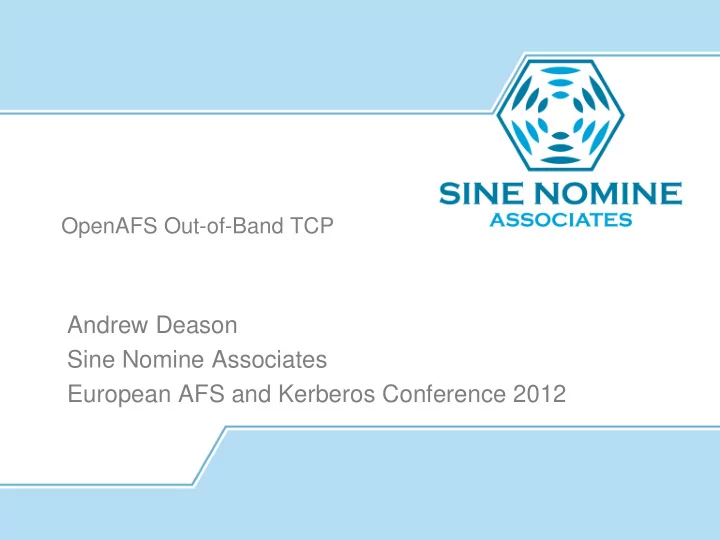

OpenAFS Out-of-Band TCP Andrew Deason Sine Nomine Associates European AFS and Kerberos Conference 2012
Agenda • Why is AFS so slow? • Project Background • OOB Design • Current Status (numbers!) • Future Directions 2
Why is AFS so slow? • Define “performance” / “slow” • AFS-specific factors (cache, CBs, etc) • Inherent UDP restrictions – Firewalls, checksum offloading, etc 3
Why is AFS so slow? • Rx implementation and protocol – See Simon’s talk(s) • Rx window size – (32 * 1400) / RTT – 1ms RTT: ~43 MiB/s – 10ms RTT: ~4 MiB/s 4
Project Background • AFS too slow for customer – Need fix quickly • Declined approaches: – RxOSD vicep-access – RxOSD non-vicep-access – RxTCP – RxUDP improvements 5
Project Background • Compromise on TCP OOB – Rx handles args, aborts, auth, etc – No long-lived TCP conns – Tie TCP conn to Rx call • Rapid development • First pass not public 6
Project Background • Started in August/September 2011 • 1.4 client/server delivered in October • 1.6 client in February • Production deployment in March/April • 1.6 server in May 7
OOB Design • Designed for rapid dev • FTP-like control/data channels • Very similar to existing FetchData64 • Not just for TCP 8
OOB Design (protocol) Say a client wants to fetch a file… Server Client 9
OOB Design (protocol) Client starts split FetchDataTCP call FetchDataTCP IN arguments Server Client 10
OOB Design (protocol) Server sends TCP information FetchDataTCP union AFSOOB_Challenge Server Client 11
OOB Design (protocol) Client creates TCP connection FetchDataTCP Server Client 12
OOB Design (protocol) Client send conn metadata (IDs Rx call) FetchDataTCP Server Client Note: data over TCP still in XDR union AFSTCP_Response 13
OOB Design (protocol) Server associates connection FetchDataTCP Server Client 14
OOB Design (protocol) Server sends file data FetchDataTCP Server Client Note: Rx call is idle union AFSTCP_FileData raw file data 15
OOB Design (protocol) Server ends FetchDataTCP call FetchDataTCP OUT arguments Server Client 16
OOB Design (protocol) Transfer is complete – TCP conn reused for 10 mins Server Client 17
OOB Design (client) • Cache-bypass-like threshold – sysctl afs.oob_tcp_thresh • RXGEN_OPCODE server detection • Parameters tweakable via sysctl 18
OOB Design (server) • libevent • Async connection receipt • TCP conns handed to Rx thread • TCP conn always after Rx call 19
OOB Design (limitations) • Extra round-trip • Not extensible well • Client code organization 20
Implementation Details • rx_FlushWriteNotLast • rxkad_Encrypt • rx_SetErrorProc • Linux configurable readahead • osi_BlockSignals 21
Current Status • 1.4, 1.6, client, server • Linux now, but portable • Cache bypass • Zero-copy fetch • Non-standard protocol published • Source available on request 22
Performance 23
Performance • 10GigE – Write: 300s MiB/s (~3gbps) memcache – Read: 500s MiB/s (~4-5gbps) memcache – Read: 700s MiB/s (~6gbps) bypass • afscp even higher with high chunksize • Same results when capped at 7gbps 24
Performance • Major limiting factors: – Chunksize (or bypass readahead size) – Cache overhead – Extra RTT • Benchmarks are “remote” 25
Future Directions • Standardize new OOB protocol – Extra RTT, UUIDs, cap bit, ext-union • Platform support • Volserver OOB 26
Questions? 27
Thanks! Andrew Deason Sine Nomine Associates adeason@sinenomine.net 28
Recommend
More recommend